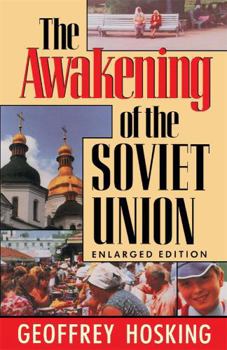The Awakening of the Soviet Union (Reith Lectures)
Select Format
Select Condition 
Book Overview
Geoffrey Hosking, one of the world's preeminent scholars of Russian history, provides a unique perspective on the rapid changes the country experienced in the late 1980s. Other books have focused on the political changes that took place under Gorbachev; Hosking's lively analysis illuminates the social, cultural, and historical developments that created the need--and openness--for sweeping political and economic change.
Format:Paperback
Language:English
ISBN:0674055519
ISBN13:9780674055513
Release Date:September 1991
Publisher:Harvard University Press
Length:256 Pages
Weight:0.85 lbs.
Dimensions:0.7" x 6.1" x 9.2"
Customer Reviews
1 customer rating | 1 review
Rated 4 starsThe country that came in from the cold
By Thriftbooks.com User,
"Ever since Krushchev eased the (Stalinist) terror in the late '50s . . . there have been warnings that we were misunderstanding" the USSR, writes Geoffrey Hosking, a University of London historian of Russia. This is true. Various memoirs, such as "Hustling on Gorky Street," which was the autobiography of a petty hoodlum in South Russia, indicated that the new, milder Communist totalitarianism did not control everyone. But...
0Report














